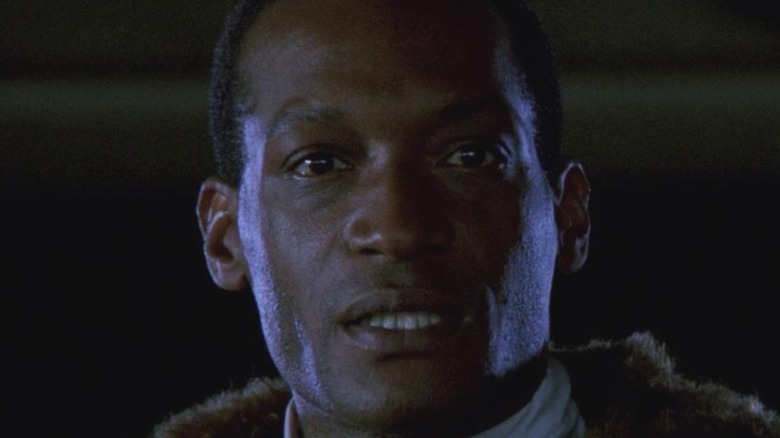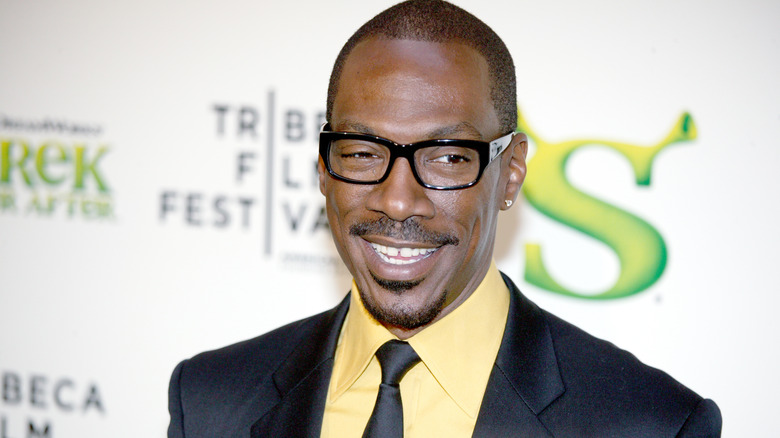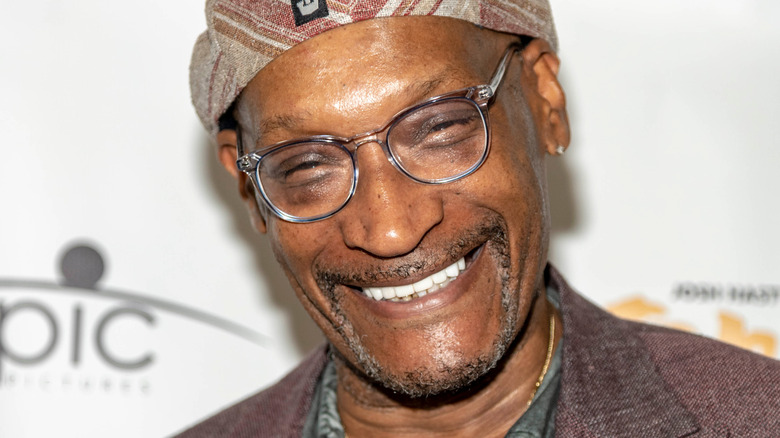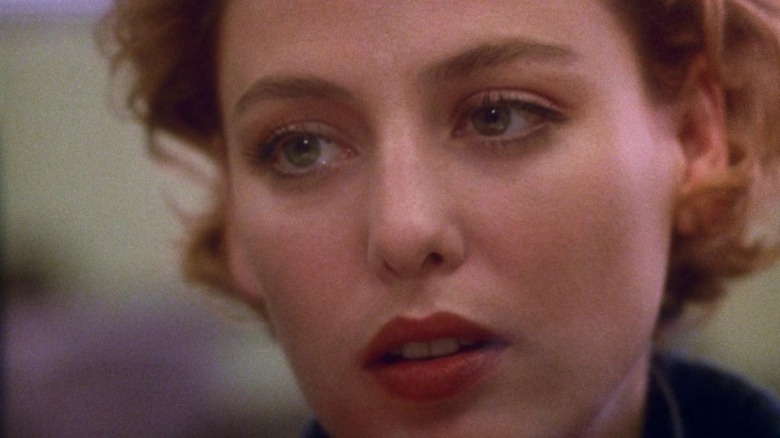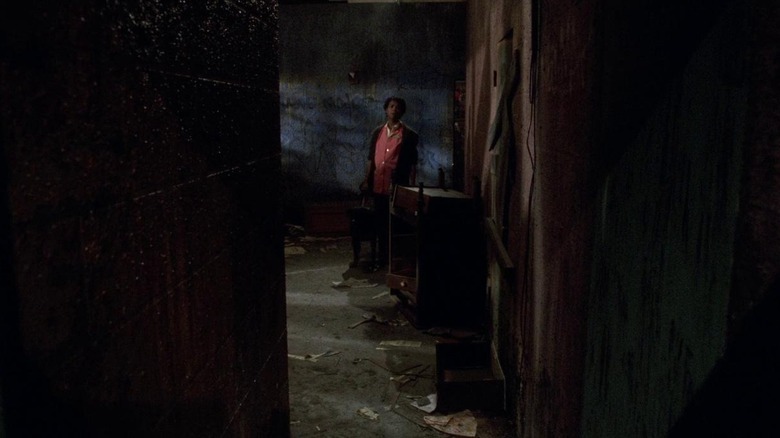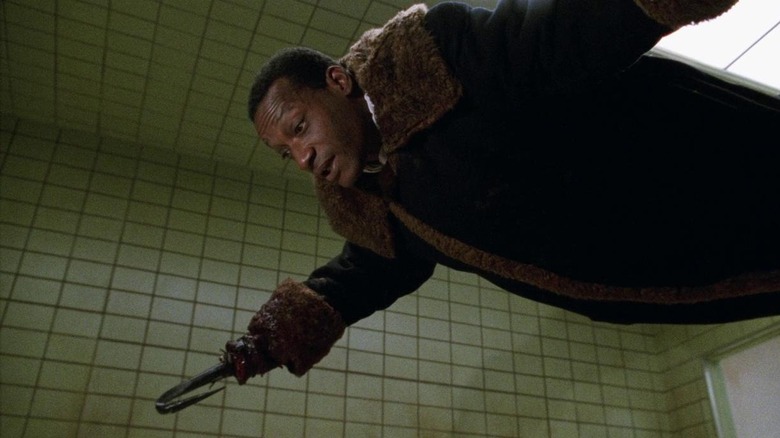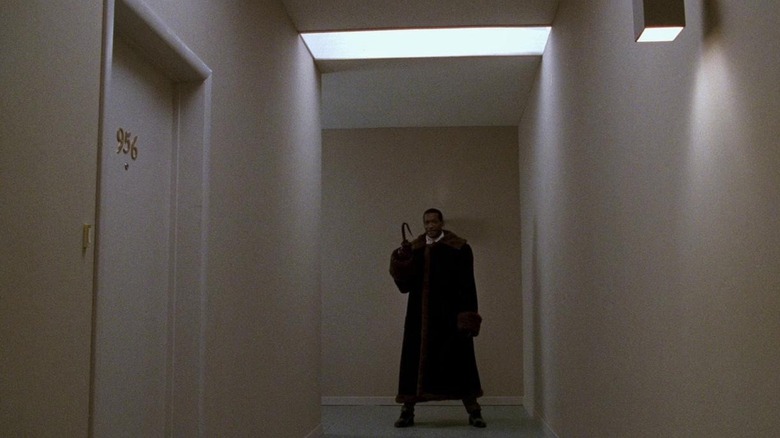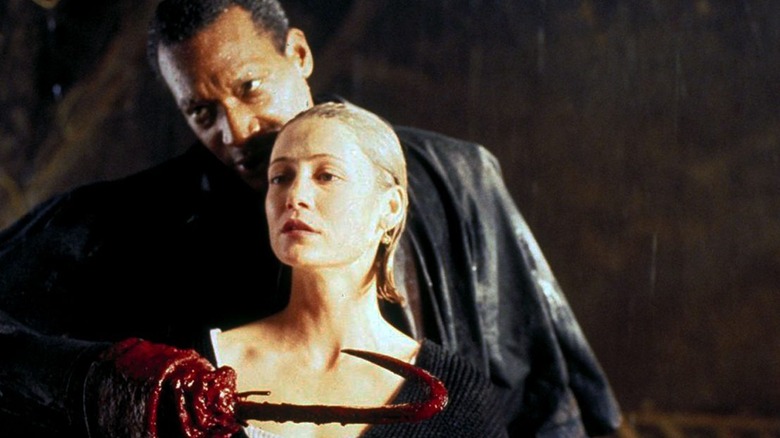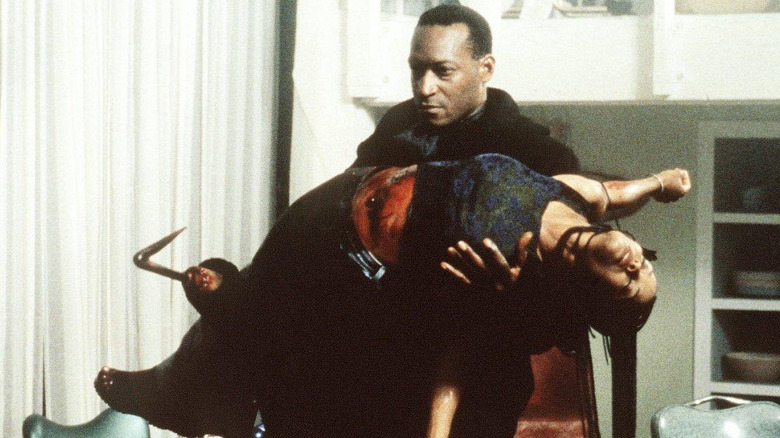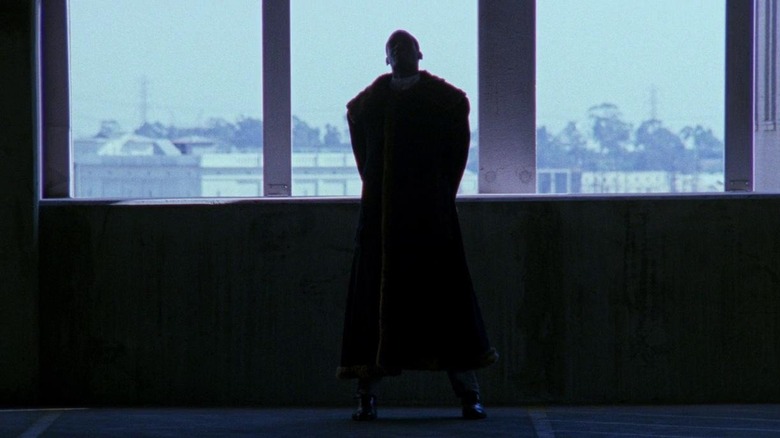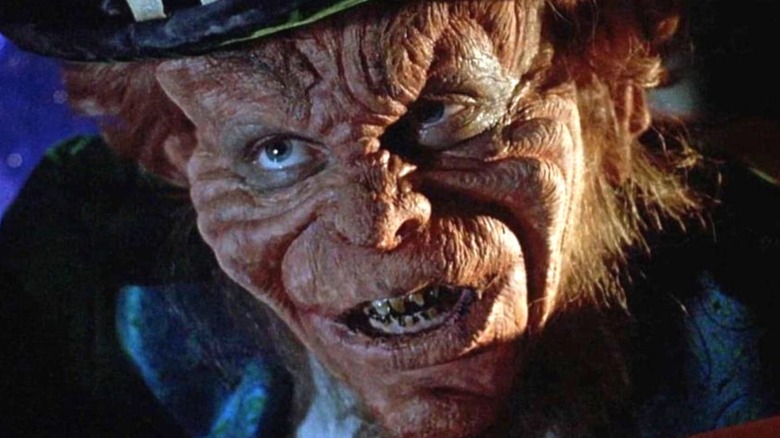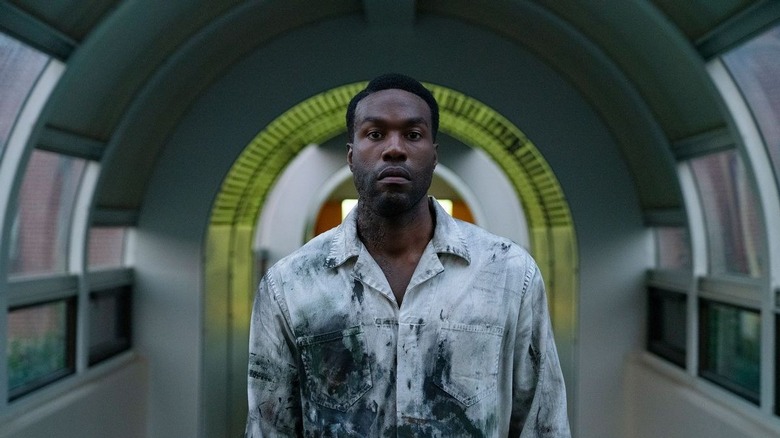The Untold Truth Of Candyman
The 1980s saw an explosion of horror movie icons enter the world of pop culture, including the likes of Freddy Kruger, Chucky, Jason Voorhees, and Pinhead. But the 1990s weren't slouching when it came to introducing famous faces that can terrify moviegoers from all corners of the globe. Case in point, the titular character of "Candyman," a figure so eerie not just because of the bees covering parts of his face or his hook hand, but of the larger issues he represents. Unlike so many shallow slasher films, "Candyman" actually represented something deeper, a way of exploring how Black people in society are deemed "monsters" just from existing. You don't need a hockey mask or a chainsaw to be seen as "terrifying" by white people if you're Black, just existing will be enough. It's a hefty message that underlines a chilling movie anchored by Tony Todd's unforgettable lead performance.
The cultural legacy of "Candyman" is enormous but it's still not big enough to ensure that every detail about this long-running franchise is common knowledge even to the most devoted "Candyman" fans. Details about who was originally set to play this titular character or abandoned concepts for entries in the franchise lend further rich layers to a series that's already packed with depth. If you think you know all there is to know about "Candyman," strap in for the untold truth of this remarkable 1990s horror series.
Eddie Murphy was supposed to play Candyman
Eddie Murphy's gone down a lot of different avenues in his time as a major presence on the silver screen. These have included everything from being a comedy leading man to providing voicework for famous features to even delivering dramatic turns in motion pictures like "Dreamgirls." But one area he's never gone into is horror cinema (save for scarily bad movies like "Vampire in Brooklyn"), but that almost changed if the "Candyman" producers had gotten their way.
According to ScreenRant, the original pick to play the titular character of "Candyman" was none other than Eddie Murphy. Mystery still surrounds why Murphy was being eyeballed for this role, though the allure of having a big name in the cast probably would've been appealing to the producers. There are similarly few details as to why Murphy didn't take the part on, though rumors abound that everything from his proposal salary to his height are possibilities. Though many unknowns surrounding the prospect of Eddie Murphy playing this part, it's hard to feel too melancholy about the loss since Tony Todd ended up crushing it in the role of Candyman.
Tony Todd got paid by the bee sting
There are lots of qualities in "Candyman" that make it a standout horror movie but few are as important as Tony Todd's performance as Candyman. The rare horror villain from the final decades of the 20th-century not to hide behind a mask, Candyman allowed Todd to show his charisma via facial performance while also conveying an undeniable air of menace. It was a riveting turn that birthed a seminal figure in the history of horror — one that was heavily informed by the fact that Todd was stung by actual bees!
"I negotiated a bonus of $1,000 for every sting during the bee scene," Todd said to The Guardian. "And I got stung 23 times. Everything that's worth making has to involve some sort of pain. Once I realized it was an important part of who Candyman was, I embraced it. It was like putting on a beautiful coat." Such extreme measures to get into character seemed to have paid off, as Todd also noted that "I've done 200 movies, this is the one that stays in people's minds. It affects people of all races." If Todd's idea of pain being the key ingredient in shaping memorable performances is true, it would explain why the performer, riddled with all those bee stings, was able to deliver a striking performance that defined "Candyman."
Virginia Madsen almost didn't score the lead role of Candyman
Though it's now hard to imagine the original "Candyman" even being able to function without Virginia Madsen inhabiting the role of Helen Lyle, Madsen originally had a different part in the project. "I was going to play the part of Kasi Lemmon, until they made the character African American," Madsen told Horror News Network, referring to the character of Bernadette Walsh. "Then I was out." Instead, Alexandra Pigg was set to take on the role of Helen Lyle, until unforeseen circumstances stepped in.
"Right before shooting, Alexandra found out she was pregnant," Madsen recounted. "It was great for me, but it was so sad for her because this was her role, she found this story and really wanted it. So, when I was asked to step in I felt like "I can't take my friend's role." She actually came over one day and said 'it would just kill me to see someone else play this role, you HAVE to be the one who plays it.; So with her blessing I took on the role. I really tried to work my butt of just to honor her." It was a long road for Madsen to secure the lead role of "Candyman" but she ended up delivering a performance that justified why she was the right fit for the part.
Composer Phillip Glass still makes a lot of money off of Candyman
Composer Phillip Glass has a long history of incredible work that has made him one of the defining examples of a minimalist musician. His accomplishments stretch far and wide across multiple symphonies and concertos, among other creations, while he's also been the centerpiece of several documentaries exploring his unique creative mindset. A key part of Glass's legacy is his work as a film composer, which included delivering the original score for the very first "Candyman" movie.
That might sound like a strange project for an artist whose works as a film composer have included titles like "Kundun" and "Notes on a Scandal." But Glass's music proved integral to accentuating the eerie atmosphere of the story and lent an extra weight of substance to a movie that was a tad weightier than your average "Friday the 13th" movie. It appears Glass did his job well in delivering a rock-solid score for "Candyman" given how enduringly lucrative it's turned out to be for him. "Once I even did a slasher movie called 'Candyman'," Glass recalled to Variety. "It has become a classic, so I still make money from that score, get checks every year."
The NAACP supported Candyman
Today, the original "Candyman" is widely-praised for being a rare 20th-century American horror movie to emphasize experiences specific to the Black community as well as delivering a notable Black horror figure in the titular Candyman. However, initially, the producers of "Candyman" had concerns about how the film would play. Would the entire production come across as offensive or insulting to a community that doesn't get represented all too often in mainstream horror cinema?
"'I had to go and have a whole set of meetings with the NAACP, because the producers were so worried," director Bernard Rose relayed to The Independent. These interactions resulted in a most intriguing outcome. "And what they said to me when they'd read the script was 'Why are we even having this meeting? You know, this is just good fun,'" Rose continued. "Their argument was 'Why shouldn't a Black actor be a ghost? Why shouldn't a black actor play Freddy Krueger or Hannibal Lecter? If you're saying that they can't be, it's really perverse. This is a horror movie...'" With the NAACP responding positively to "Candyman," there was a renewed sense of behind-the-scenes confidence in what would turn out to be a new horror classic.
The critical legacy of the original Candyman
Upon its initial release, "Candyman" scored positive marks from critics. Roger Ebert, for example, praised the movie for deftly juggling real-world threats with ones left ambiguous with whether or not they were rooted in reality. "What I liked was a horror movie that was scaring me with ideas and gore, instead of simply with gore," Ebert concluded. Similar sentiments, as well as praise for the performances of Virginia Madsen and Tony Todd, populated the general reception to "Candyman" when it first hit theaters.
As the years have gone by, "Candyman" has only increased in its positive reception, with retrospective reviews taking particular note of the sociopolitical commentary that underpins the entire production. "In a political climate where fear and stereotypes are tearing America's psyche to shreds, Candyman is scarier than ever because it reveals how deftly we can damn each other. That's genuinely terrifying no matter how many times you say it into a mirror," wrote Evan Narcisse for Rolling Stone in 2018. While some hit horror titles are only well-regarded temporarily, the positive reputation of "Candyman," keeps on growing like the legend of the films titular character.
The original plans for Candyman 2
The original "Candyman" movie spawned two immediate sequels. However, neither of them were what "Candyman" director Bernard Rose had in mind when he first imagined a follow-up to this 1990s horror film. Rose wanted to go in a direction that would not only unnerve audiences but deviate from the first "Candyman."
"It was not directly following on from the story [of the first film] at all," Rose said to Bloody Disgusting about his vision for "Candyman 2." "But following on from the idea of the mythical 'bogeyman', and what its origins were. What it is about these sort of figures in history and in society that's so universal and terrifying." This led to Rose deciding to make a movie centered on a British policeman tracking down Jack the Ripper in a story that would have been inspired by the Clive Barker text "Midnight Meat Train." The reason for why this never went forward is quite obvious. "No Candyman," Rose said. "He was mentioned in the story, because I had Purcell, the professor [from the first film] popping up as a character. And he basically said 'The Ripper is *like* a Candyman'. So there we are. I had him in the script, and mentioned the word 'Candyman' once. 'This is kind of like a Candyman'." Though Rose felt Candyman dying meant a sequel had to follow a new monster, none of the producers cared for this idea one bit, leaving Rose's ambitions for "Candyman 2" unmade.
The disappointing critical response to Candyman 2
While the original "Candyman" has become a beloved part of 1990s horror cinema, the initial two sequels to that feature have been far less well-received. This includes "Candyman: Farewell to the Flesh," which was helmed by Bill Condon. The future Oscar-winning artist who would go on to direct movies like "Gods and Monsters" and "Chicago" couldn't elevate this "Candyman" installment, which was largely received as a hollow shell of its predecessor.
In a review for the films 2015 Blu-Ray release, Keith Phipps of The Dissolve noted that "there's evidence of the better filmmaker Condon would soon turn into" within "Candyman: Farewell to the Flesh." "Mostly, however, 'Candyman: Farewell To The Flesh' is content to rely on easy jolts and an overabundance of fake-out scares, rather than hard-earned suspense," Phipps concluded. "It's never awful, but it also never feels necessary. Mostly, it proves that even the most innovative horror concepts can find ways to spin their wheels." Similar sentiments were found in other reviews, with excessive amounts of violence and blood also popping up throughout other dismissals of the film. With "Farewell to the Flesh," the "Candyman" franchise had gone from innovative to rudimentary.
The transition to DTV sequels with Candyman 3
Though "Candyman: Farewell to the Flesh" was received with far more criticism than its predecessor, the brand name of the franchise was still recognizable enough to inspire yet another follow-up. This time, "Candyman: Day of the Dead" would bypass movie theaters in favor of a small-screen debut. As to be expected, the quality of this feature dropped significantly from even its maligned predecessor and "Day of the Dead" received the worst reviews of any installment in the franchise.
The biggest recurring critique of "Day of the Dead" was how it indulged in the kind of tiresome horror movie clichés the original film subverted. Rob Hunter of SlashFilm, for example, noticed the large amount of naked women who are murdered throughout the runtime, a move he dubbed "cheap and unnecessary" and a far cry from the days when Helen Lyle had actual agency as the lead character of the original "Candyman." Alan Jones of Radio Times, meanwhile, lambasted "Day of the Dead" for "overdoing the gore to a laughable degree" while also failing to deliver tangible scares. With these and other shortcomings dragging down "Day of the Dead," the quality levels of the original "Candyman" had become a distant thing of the past.
The unmade Candyman 4
Even after "Candyman: Day of the Dead" sunk the franchise to new lows in terms of overall critical reception, there appeared to be initial interest in continuing this series with another sequel. This proposed fourth "Candyman" movie never got off the ground but Tony Todd has shed some helpful light on what exactly "Candyman" fans could've expected if it had ever gotten made.
"This was around twenty years ago," Todd explained to Bloody Disgusting about "Candyman 4" in June 2021. "It was going to take place in New England during a snow storm, because I just had this image of Candyman in a blizzard. Because I'm from New England, and I knew the power of having that mythic character in a snowstorm being undeterred by the elements. We had gone so far as to establish him as a professor at a girls' college." This environment would've seen Todd's Candyman trying to live an ordinary life but always facing temptation to revert to his original supernatural form. "That's why I wanted him in a female environment, trying to keep his temperament in check, until something happened," Todd further noted. "Something horrific happens to some of the students, and his inner compulsions return. We hadn't fully decided what that triggering event was." There would never be a chance to flesh out the story further as Todd said the animosity between dueling production companies who owned the rights to "Candyman" doomed this take on a new "Candyman" movie.
Yes, there almost was a Candyman vs. Leprechaun movie
The original "Candyman" is a rather serious affair — touching on heavy topics like racism, gentrification, and how skin color affects who gets dubbed a "monster" in American society. Of course, to many producers in Hollywood that have a low opinion of the horror genre, the fact that it's also a scary movie automatically makes "Candyman" schlock that can be exploited for an easy dollar. This is especially apparent in a proposed idea for a movie that would've seen Candyman duking it out with Leprechaun. Yes, at one point in time, "Candyman vs. Leprechaun" was a finished screenplay somebody wanted to produce.
The world can thank Tony Todd for putting a stop to that proposed idea. "This was right around the time of 'Freddy vs Jason' and ['Candyman vs Leprechaun'] did come across my desk," Todd recalled to Dread Central. "I saw it and I said, 'I will never be involved in something like that.' I respect the character. Once a horror character becomes something of an icon [like Candyman], reluctantly or not, you have to treat that with respect that. I remember watching 'Abbott and Costello vs Frankenstein' continuously as a kid and being amazed that my horror legends were making a comedy. So, I guess there are some ways to make something like that work, but I wasn't interested in doing that with Candyman."
The plan to be respectful but scary with Nia DaCosta's Candyman
After nearly two decades of no new entries in the "Candyman" franchise, word officially broke at the end of 2018 that none other than Jordan Peele — fresh off winning an Academy Award for the screenplay for "Get Out" — was being charged with penning the script for a new take on "Candyman." In addition to confirming the movies original June 2020 release date, the announcement also made it clear that "Little Woods" helmer Nia DaCosta was going to be directing this new "Candyman," which had a very specific creative vision in mind.
Speaking to Entertainment Weekly, then-MGM President Johnathan Glickman noted that the creative team behind this new "Candyman" had crafted "a story that will not only pay reverence to Clive Barker's haunting and brilliant source material but is also thoroughly modern and will bring in a whole new generation of fans." Peele reaffirmed this commitment to the old and the new in his own statement, which remarked that "we are honored to bring the next chapter in the Candyman canon to life and eager to provide new audiences with an entry point to Clive Barker's legend." With Peele and DaCosta's sights set on doing something new without forgetting the past, it became clear that there was a concrete enough vision behind this new "Candyman" to justify resurrecting the franchise after such a long hibernation.
